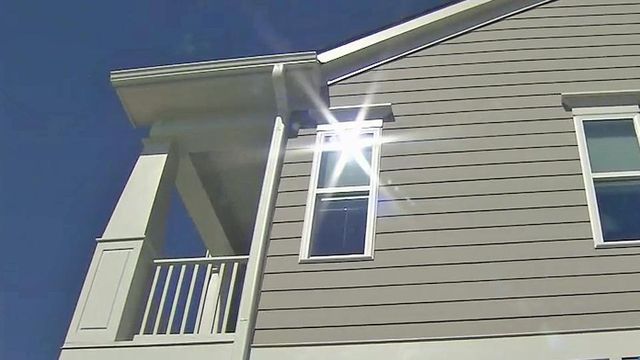State offers builders alternative to Low-E glass
A WRAL News investigation into windows that reflect sunlight like a big magnifying glass has the state considering a change to the building code.
Posted — UpdatedA WRAL News investigation into windows that reflect sunlight like a big magnifying glass has the state considering a change to the building code.
State building code requires Low-E windows for their energy-saving benefits. They have a coating that reflects the sun, keeping it cooler indoors. But the reflective quality has proven so strong that it melts vinyl siding and parts of cars. There are even reports that reflections from the roofs of sunrooms started fires on cedar shingles on at least four homes across the country.
Dan Tingen, chairman of the North Carolina Building Code Council, said his group spent more than a year looking into complaints that the windows were doing damage, but they hadn't reached a solution until the WRAL News report upped the ante.
"That was a concern, we just couldn't document it," Tingen said.
The reported fires raised the level of concern, and the council adopted an emergency rule as a first step toward change, Tingen said.
"It gives the builder the option of using non-reflective glass in locations that he can anticipate having a problem," Tingen said.
Low-E windows make up more than 90 percent of all new installations. In Knightdale, residents reported home after home after home with melted and warped vinyl siding.
"We certainly wouldn't have parked our vehicles here if we had any kind of warning," said Michelle Curtis.
"When things get really, really dry, and you've got a temperature high enough to bubble plastic on that young lady's car, that's pretty intense heat, and it wouldn't take much more to get pine straw or some other sort of mulch around the house to catch fire," Tingen said.
The window industry opposes the change. In a letter to the state Building Code Council, representatives wrote that it will have "a long-term negative impact on energy efficiency."
No one from the Window and Door Manufacturers Association answered calls from WRAL News for their solution.
The rule could take effect July 1.
For homeowners, the windows cost about the same whether they are Low-E or not.
• Credits
Copyright 2024 by Capitol Broadcasting Company. All rights reserved. This material may not be published, broadcast, rewritten or redistributed.






